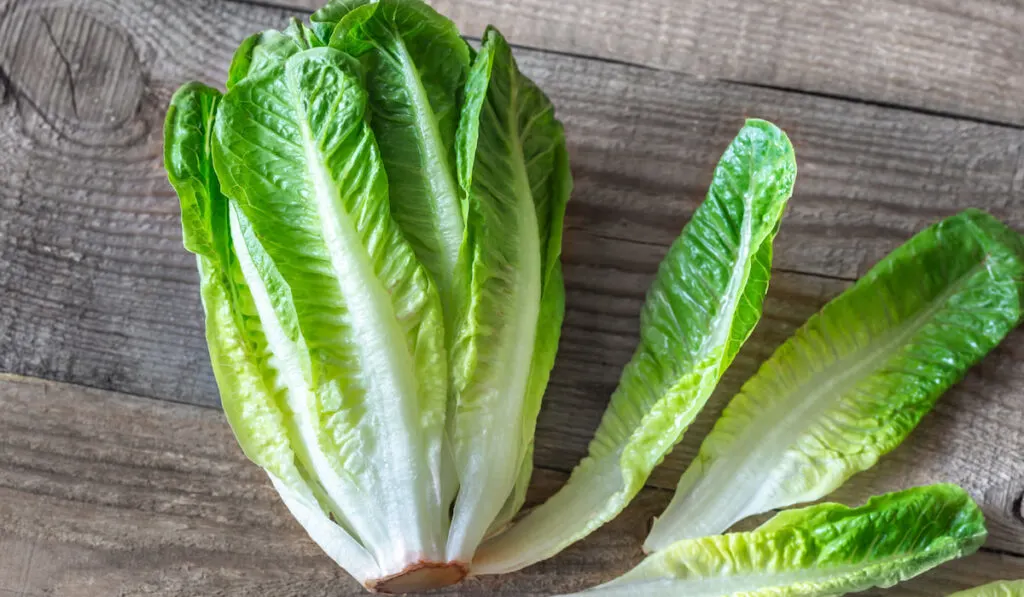When it comes to farm animals, goats are one of the most interesting animals you can own. They are fun to watch and can easily be raised even on a small farm due to their relatively few requirements.
Their short stature and relatively friendly behavior makes them generally safer than cows and horses.
In fact, their daily requirements can easily be met by most children which makes them great for first time livestock owners.
Goats can be kept for milk, fiber, meat and manure. Of course, some of us raise them as pets as well.
Because goat farming is increasing in popularity, more and more people are searching the web for food items for their goats that are both easy to feed and safe for the goat to eat.
If you are a lover of goats and their milk, you would probably know the classic story of “Heidi” and her lovely goats. Although her goats had a lot of mountain shrubs and herbs to eat, we can’t always provide that kind of diet for our goats.
Table of Contents
Can Goats Eat Lettuce?
Lettuce is a vegetable that almost all goats enjoy. All common types of fresh lettuce are safe for goats to eat in limited quantities. Lettuce makes a great treat, but should not be a goat’s main diet.

All of our research indicates that goats can eat lettuce in limited quantities without adverse effects.
In fact, lettuce is nutritious for goats to eat. It has essential vitamins and minerals that goats need.
Types of Lettuce Goats Can Eat
When we decide to provide lettuce for our goats, we have to understand that the nutritional composition of lettuce varies depending on what type is being fed.
There are several types of lettuce goats can safely eat. These include:
- Iceberg Lettuce
- Romaine Lettuce
- Boston Lettuce
- Butter Lettuce
- Arugula
- Batavia Lettuce
- Bibb Lettuce
There are, of course, other varieties, most of which should be equally as safe to feed. The most common varieties are Iceberg and Romaine.
Should You Feed Goats Iceberg Lettuce?
Some people believe that iceberg lettuce doesn’t have any nutritional value for goats.
It’s true that iceberg lettuce is low in vitamins and minerals compared to other leafy greens, but lettuce shouldn’t be the staple of your goat’s diet.
So, even feeding Iceberg lettuce is fine as a treat, it just isn’t the most vitamin rich compared to other options.. And definitely, goats can eat iceberg lettuce. It has vitamins like A, C, and K, as well as minerals like folate, calcium, and potassium, which are essential to the goat’s well-being.
Should You Feed Goats Romaine Lettuce?
As you would know, another popular lettuce variety is Romaine. It is popular because Romaine is very rich in vitamins as well as minerals like potassium, folate, calcium, phosphorus, and magnesium.
This makes romaine lettuce a very healthy treat for goats.
But goats need a wide variety of foods to fulfill their nutritional needs. We can’t feed them lettuce alone; even it is full of nutrients.
Feeding lettuce would be great if it is provided with some other food rich in vitamins and minerals.

Are There Any Types of Lettuce Goats Can’t Eat?
The jury is out on whether or not goats should be fed kale.
Some say that large quantities of kale can damage the red blood cells of goats, even leading the red blood cells to rupture.
As a result, goats will pass red urine, and if this continues, it can develop into anemia and weight loss.
Yet other goat owners say that they feed their goats kale occasionally without issue.
So, when it comes to kale, it’s probably best to leave it off your goats menu, or at least check with your veterinarian before feeding it.
Lettuce as a Forage Replacement for Goats
If you want your goats to be strong and healthy, you have to feed them well. Goats mainly depend on pasture for their nutritional requirements, such as vitamins and minerals.
Sometimes though, pasture isn’t an option and we have to provide feed for the goats. This is especially common for goat owners in more urban areas.
Even with pastured goats, there could be some vegetation that is naturally low in nutrients.
Just think about a dry season. Goats may not be able to find enough fresh leaves or shrubs in such a situation.
In these cases, commercially available forage should be provided as a main nutrition source. This can include most hays and legumes including alfalfa hay, oat hay, etc.

2 Ways Lettuce Helps Goats
1. Providing Phosphorus for Growth
Lettuce can be a great supplemental nutrition source as it is rich in a lot of nutrients that a goat acquires during a day.
In fact, for young growing animals it can provide phosphorus, a mineral crucial for the growth and development of animals.
Phosphorus deficiency is known to cause inadequate growth, lameness, and lazy appearance. Lettuce contains calcium too, which is important for the proper growth of teeth, muscle, and bone.
2. Increasing Milk Production
We all know a lactating animal needs more vitamins and minerals than the rest. It’s the same for goats too.
As lettuce contains a lot of vitamins and minerals, it can improve the quality of milk. Studies show that the goats who ate lettuce could produce more milk than others.(source)
We all love to feed our goats as much as we can. And we love to see them grow healthy and happy. But if you need to make some changes in their diet, you have to think properly and plan appropriately.
Even if everyone says goats can eat anything, we know that isn’t the case.
Sudden changes in a goats diet are not advisable. Remember that any changes in their diet should happen gradually.
Eating Habits of Goats
Have you ever seen these funny and lovely creatures not wandering and staying still for at least 15 minutes? No.
Goats naturally love to wander every nook and corner and explore varieties of foods. Probably the incredible healing power of goat milk, which gives us numerous benefits, comes from this wide variety of foods that goats consume.
Though people often have the misconception of “goats can eat everything,” it’s not true.
Goats indeed like to have nibbles throughout the day; as they are ruminants, they have four stomachs to completely digest the significant amount of fiber they eat through plant materials.
Goat’s digestive system is related to sheep and cattle, the other well-known ruminants. But these lovely creatures are often more related to deer, who eat bushes and trees, other than cattle and sheep who eat more grass.
After eating fully, goats find a relaxing and safe place to ruminate.
Other Foods Goats Can Eat
Goats are grazing animals and the nature of walking here and there and exploring food is greatly associated with goat’s well being.
A goat’s natural diet consists of clover, grass, shrubs, legumes, young leaves, fruits, vegetables, hay, and grains.
A goat’s main diet should be forage or roughage but goats can eat small quantities of the following foods.
Goats can eat grains like:
- Rice
- Millet
- Oats
- Sorghum
- Barley
Goats can eat fruits like:
- Watermelon
- Pears
- Peaches
- Apples
- Apricots (with the pits removed)
- Blueberries
- Bananas
- Oranges
- Kiwi Fruit
- Mangoes
- Raspberries
- Strawberries
- Plums (with the pits removed)
Goats also enjoy vegetables such as carrot, pumpkin, celery, squash, spinach, and, of course, lettuce.
Goats can eat vegetables like:
- Carrot
- Pumpkin
- Celery
- Squash
- Zucchini
- Spinach
- Lettuce
Of course, you can feed kitchen scraps to goats as well so long as they are the scraps of items that are safe to eat (like any on the list above).
When feeding scraps just be aware that extra ingredients we add to flavor our foods like oils and sauces, aren’t always particularly healthy for goats to eat.
Whether feeding raw foods or scraps from the house, always make sure that you never offer goats spoiled or rotten food.
Items that have wilted, rotted, or otherwise spoiled are best used in a compost pile or thrown in the trash and not fed to your beloved farm animal friends.
Happy Goating!
Resources
- https://farmingmethod.com/goats-feed-
- https://www.betterhensandgardens.com/garden-greens-for-goats-chickens/
- https://agricsite.com/can-goats-eat-lettuce/
